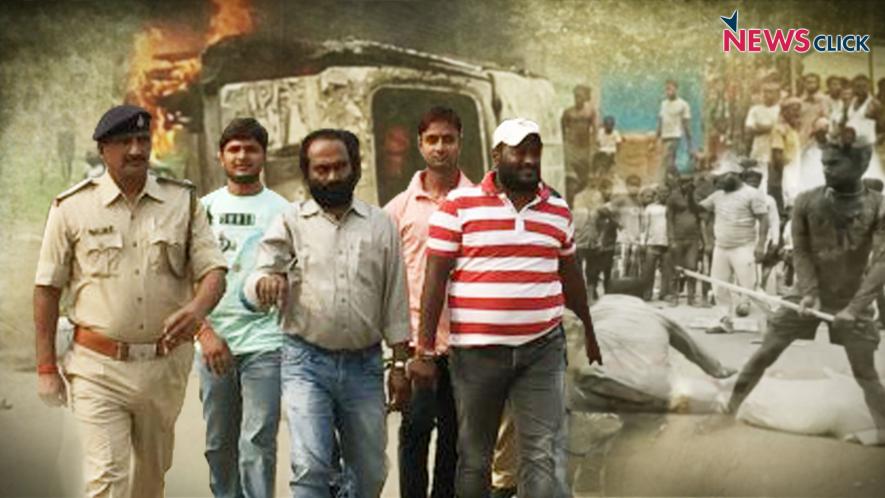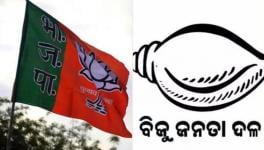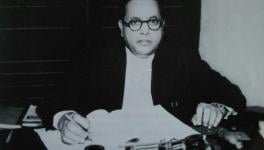Jharkhand Lynching: Lawyer Explains How Alimuddin Ansari Got Justice

Newsclick Image By Nitesh
A fast-track court in Jharkhand on March 16 decided the case of Alimuddin Ansari – a meat trader who was lynched to death by self-proclaimed ‘Gau Rakshaks’ (cow vigilantes) at Bazartand in Ramgarh in June 2017 – in a record time of just seven months. Of the 12 accused, 11 were convicted and sentenced to life imprisonment. The court did not give any decision on the 12th accused since he is a minor.
During the trial, 19 witnesses were questioned and cross-questioned and around 44 evidence were examined in addition to a bulky charge-sheet.
This case stands in marked contrast to the fate of 60 incidents of cow-related violence in the past eight years (2010 to 2017), in which 25 people were killed. The 97% of these attacks were reported after Prime Minister Narendra Modi’s government took over in May 2014. All these cases are dragging in the courts while victims await justice. Alimuddin’s case is the first ever case related to cow vigilantism in the country in which the accused have been convicted.
The incident had got media attention and also rocked Parliament, with several Opposition leaders questioning the government’s seriousness in taming the frenetic mobs. Facing flak, the state government, led by Chief Minister Raghubar Das, has warned police officers that they would be held responsible for any mob lynching reported from their area.
The state also approached the Jharkhand High Court, requesting that it constitute a fast-track court to try the Ramgarh lynching case. The police had filed a charge sheet in September 2017 and as many as 19 prosecution witnesses were examined in the case.
The Alimuddin lynching case has presented an example that can be followed in all such cases with an aim to ensure justice to the victims and serve as a deterrent to others.
To know about the proceedings of the case and why trial in other cases are not so rapid, Newsclick spoke to informant lawyer Raju Hembrum who was assisting the prosecution in the case.
“The first challenge that comes in the cases of hate crimes is no good lawyer wants to take up the case at the level of the trial because of several reasons such as fear of threat to life, given the communal nature of the case and an invisible boycott in the legal fraternity. Even if they take it, they don’t pursue it seriously,” he said.
“The second challenge”, he said, “is witnesses generally avoid coming to the fore in such cases and if they gather the courage to come forward and get their statements recorded, they turn hostile because of fear and political pressure”.
The third challenge, according to him, is the botched up police investigation and interference of politicians.
He said in the Alimuddin’s case as well, initially, no lawyer came forward. “I took up the case on my own and the decision was like playing with fire given the hostile situation in the state where fringe elements enjoy state patronage. I did not meet even a single hearing. I met all witnesses to ensure their safety and security. I collected the evidence to make it a strong case,” said Hembram.
He further said he ensured that no accused got bail. “We opposed bail pleas tooth and nail and successfully convinced the court that if the accused was granted, they would influence the witnesses. It was our first success,” he said, adding that “the witnesses would have turned hostile had the accused been released on bail”.
He also said the investigating agency did a wonderful job in completing the probe in time, nabbing the culprits and collecting the evidence. The prosecution, he said, was extremely swift and ensured no hearing goes waste.
But how did all these become possible? “This might be because the incident took place hours after Prime Minister Narendra Modi warned cow vigilantes against taking the law into their own hands and condemned violence perpetrated in the name of protecting the bovine considered holy by many Hindus. It might be an attempt to give out a message that the PM meant what he had said,” he speculated.
Asked if he got any threat from anyone, he said, “Not directly, but several people discouraged me from going ahead. But I never cared and fought for justice.”
Asked why such cases are pending in the court in other states and such speedy verdict is not likely in the near future, Hembrum replied, “It is because of the lethargic attitude of the police and prosecution.”
Secondly, he said, lynching does not find mention in the Indian Penal Code (IPC). No particular law has been passed to deal with such incidents of hate crimes. The absence of a codified law to deal with mob violence or lynching makes it difficult to deliver justice in cases of attacks in the name of cow and communal riots. “However, Section 223(a) of the Code of Criminal Procedure (CrPc), 1973 says that persons or a mob involved in the same offence in the same act can be tried together. But this has not proved to have given enough legal teeth to the justice delivery system,” he added.
The Jharkhand court held all 11 accused – including a BJP leader – guilty under Section 302 (murder) of the IPC in the Alimuddin’s case. Three of them were convicted under Section 120B (criminal conspiracy) of the IPC, which apparently means that the attack was pre-planned.
Get the latest reports & analysis with people's perspective on Protests, movements & deep analytical videos, discussions of the current affairs in your Telegram app. Subscribe to NewsClick's Telegram channel & get Real-Time updates on stories, as they get published on our website.
























